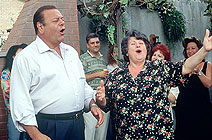|
|
|
|
Mambo
Italiano
|
 |
|
The publicity for this film is keen to present it as another My Big Fat Greek Wedding (2002), except set within an Anglo-Italian family. You would hardly guess that it is in fact a film from Quebec, or that its hero is gay. So, it was a disconcerting experience to watch this film in a suburban multiplex with a family audience which obviously expected something a little more palatable. The soundtrack was occasionally drowned out by the screams of revulsion that arose from this crowd every time two shirtless men even got close to each other. The gay men in question are aspiring television writer Angelo (Luke Kirby) and hunky cop Nino (Peter Miller). Both hide their affair from their close-knit suburban community, and especially from their respective families. What Mambo Italiano does share with My Big Fat Greek Wedding is a heavy reliance on ethnic stereotypes for humour. Angelo's parents, Maria (Ginette Reno) and Gino (Paul Sorvino) shout, go red in the face, exhort their grown children to eat up, and whack them on the back of their heads if they show disrespect. In the corner, Angelo's hyper-neurotic sister, Anna (Claudia Ferri) keeps popping anxiety pills. Director and co-writer Émile Gaudreault steers the film closer to a low-key, whimsical fantasy like Ma vie en rose (1997) than a wiser, more spirited comedy of manners such as Ang Lee's The Wedding Banquet (1993). Gay love is presented by Gaudreault as a dreamy, pastel haze, while all the straight characters are mired in their daily banalities and problems. The film is powered, Amélie-style, by a voice-over narration that whisks us through the exposition and gets a few decent jokes in along the way. One begins to tire, however, of Angelo's smug, self-centred viewpoint – which renders his grand castigation of his parents as "worthless" less brave than it is presumably meant to be, and makes it hard for us to believe in what subsequently ensues. Mambo Italiano owes more to television sitcom and theatre (it is based on a play by Steve Galluccio) than to the grand traditions of cinema comedy. The actors play it large, with the design and costuming further exaggerating the kitsch effect. Fortunately, some touching moments, especially a cemetery scene between Maria and Gino, are touching enough to win over even the most hardened homophobes in the audience. © Adrian Martin October 2003 |
![]()